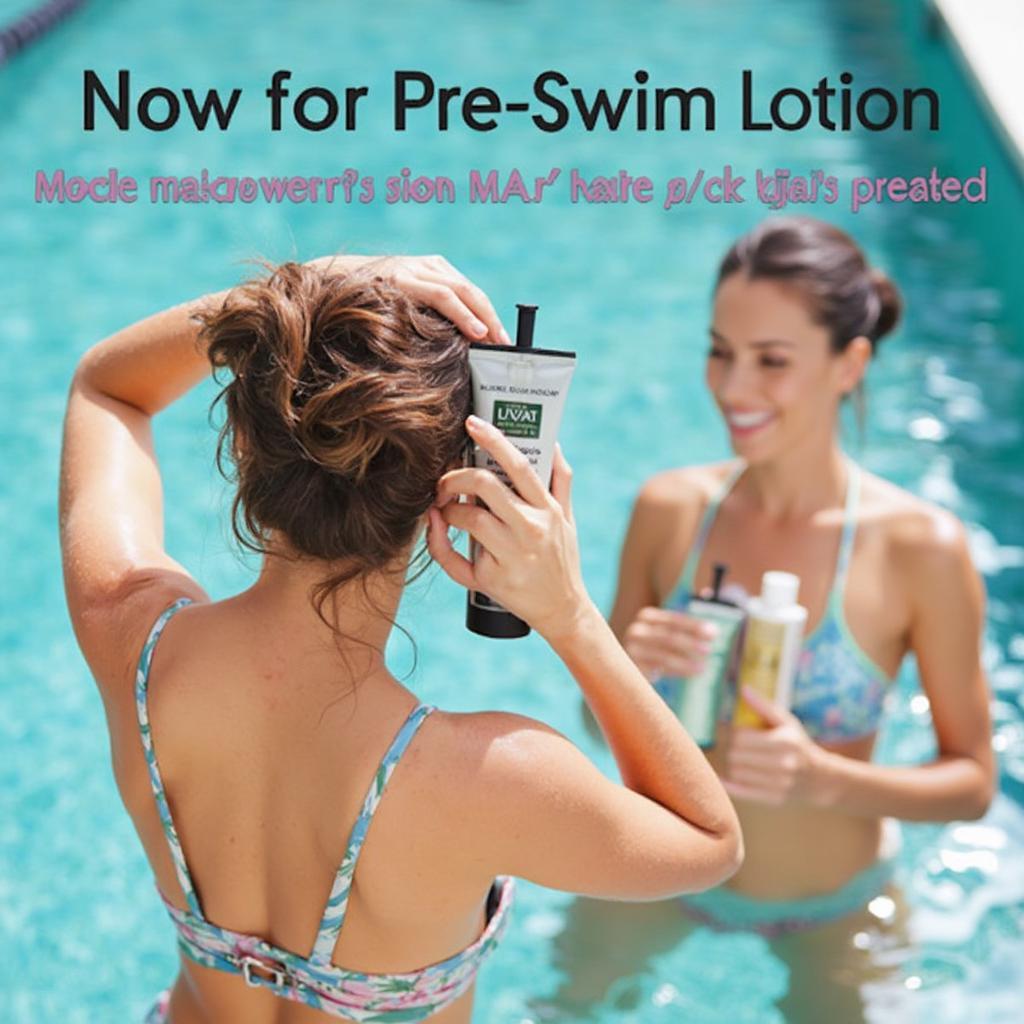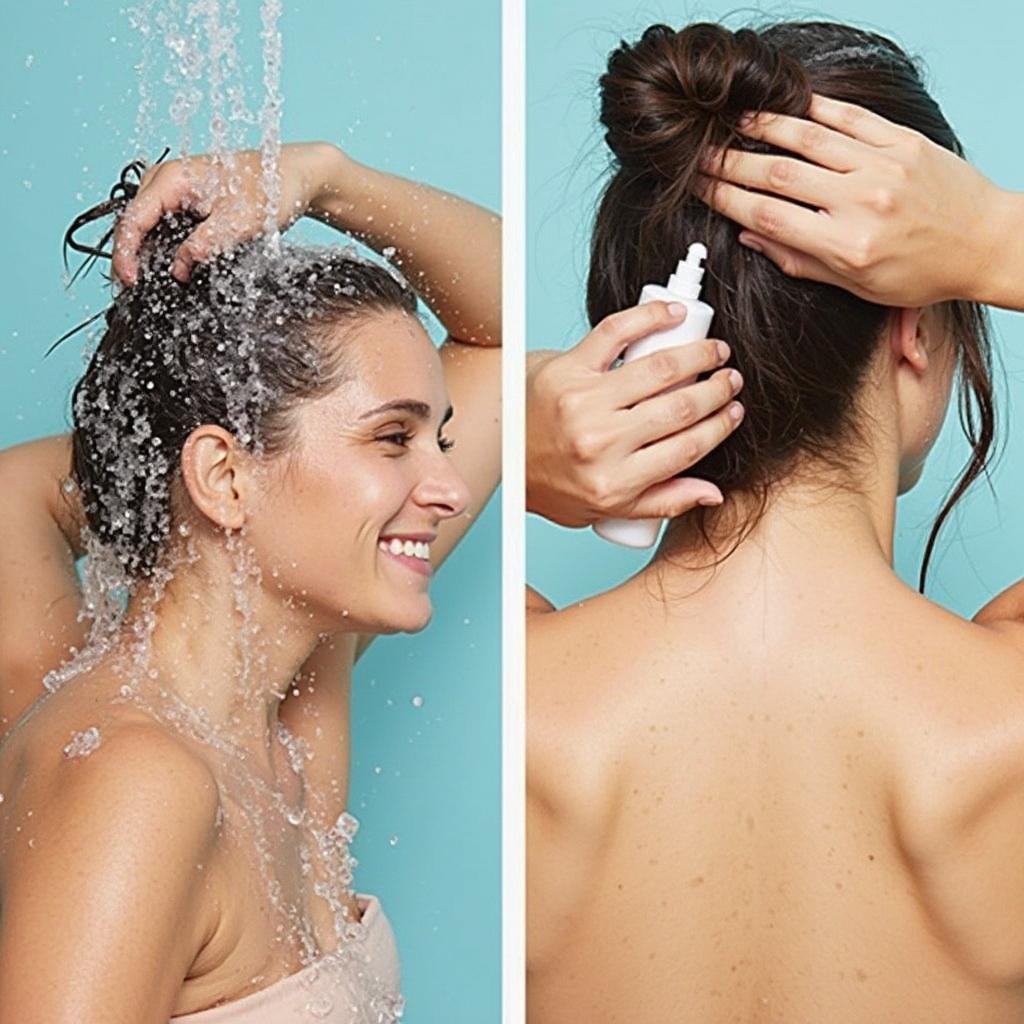Your cart is currently empty!

Skin and Hair Care Tips for Swimmers
Protecting your skin and hair from the damaging effects of chlorine and other pool chemicals is essential for every swimmer. Skin And Hair Care Tips For Swimmers often focus on pre-swim protection, post-swim treatment, and maintaining healthy habits throughout the year.
After a refreshing dip in the pool, your skin can feel dry and tight, and your hair might become brittle and prone to breakage. This is where a solid skin and hair care routine comes in. Following these tips will ensure you can enjoy your time in the water without compromising your skin and hair health. skin care tips for swimmers offer a deep dive into preserving your skin’s natural barrier against harsh chemicals.
Pre-Swim Protection: Shielding Your Skin and Hair
Before diving in, take preventative measures to minimize the impact of chlorine. Wet your hair thoroughly with clean water before entering the pool. This helps saturate your hair, reducing the amount of chlorinated water it absorbs. Applying a protective oil or leave-in conditioner can further create a barrier against chlorine. For your skin, consider using a pre-swim lotion or cream specifically designed to protect against chlorine and other pool chemicals.
 Pre-Swim Protection for Hair and Skin
Pre-Swim Protection for Hair and Skin
Post-Swim Care: Replenishing Moisture and Removing Chlorine
Immediately after your swim, rinse your hair and body thoroughly with clean water to remove as much chlorine as possible. Then, use a specialized swimmer’s shampoo and conditioner to further cleanse and hydrate your hair. swimming hair care tips provide additional advice on maintaining healthy hair despite frequent swimming. For your skin, apply a moisturizing lotion or cream specifically formulated for post-swim care. These products help replenish lost moisture and soothe any irritation.
 Post-Swim Routine for Hair and Skin
Post-Swim Routine for Hair and Skin
Maintaining Healthy Skin and Hair: Long-Term Strategies
Beyond immediate pre- and post-swim care, long-term habits contribute to healthy skin and hair. Stay hydrated by drinking plenty of water throughout the day. This helps maintain your skin’s elasticity and keeps your hair from becoming dry and brittle. Eating a balanced diet rich in vitamins and minerals also contributes to overall skin and hair health. Consider incorporating a weekly deep conditioning treatment into your hair care routine to restore moisture and prevent breakage. hair care tips for natural african hair can provide further insights into deep conditioning and moisturizing techniques, especially beneficial for dry and damaged hair.
What about protecting my nails?
Just like your hair and skin, your nails can also be affected by chlorine. Keep them short and consider applying a coat of clear nail polish to provide a barrier against the chemicals. natural cuticle care tips can help maintain healthy nails overall.
“Regularly moisturizing your cuticles is crucial, especially for swimmers,” says Dr. Amelia Carter, a dermatologist specializing in sports-related skin conditions. “Dry, cracked cuticles can become more susceptible to infections and irritation from pool chemicals.”
Should I wear a swim cap?
While a swim cap can help protect your hair from chlorine, it doesn’t offer complete protection. Water can still seep in, so it’s important to follow the pre- and post-swim care tips regardless of whether you wear a cap.
In conclusion, maintaining healthy skin and hair while enjoying regular swims requires a consistent and dedicated approach to skin and hair care tips for swimmers. By incorporating these tips into your routine, you can minimize the damaging effects of chlorine and other pool chemicals, ensuring your skin and hair remain healthy and vibrant.
FAQ
- How often should I wash my hair after swimming? Ideally, after every swim.
- Can I use regular shampoo and conditioner? Specialized swimmer’s products are recommended.
- What are the best ingredients to look for in swimmer’s hair care products? Look for chelating agents and moisturizing ingredients.
- Can chlorine cause skin rashes? Yes, especially for those with sensitive skin.
- How can I protect my hair color from fading in the pool? Use a leave-in conditioner with UV protection and wear a swim cap.
- What should I do if my skin feels itchy after swimming? Rinse thoroughly and apply a soothing moisturizer.
- Are there any natural remedies for chlorine-damaged hair? Coconut oil and apple cider vinegar rinses can be helpful.
Need more tips for car maintenance? Check out our article on tips for leaving car for long time.
For any car diagnostic support, feel free to reach out to us via WhatsApp: +1(641)206-8880, Email: [email protected] or visit us at 456 Pine Avenue, Toronto, ON M5V 2J4, Canada. We offer 24/7 customer support.

Leave a Reply